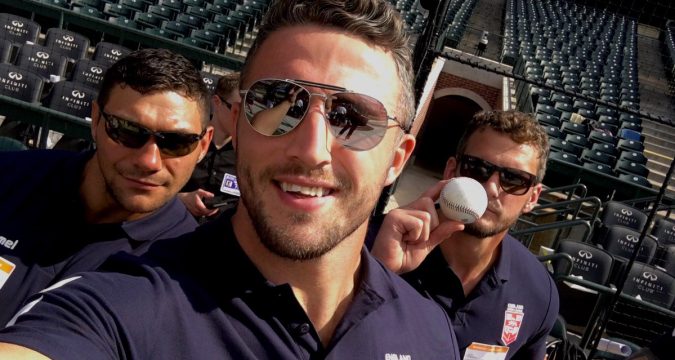
It’s difficult to see it sometimes amidst all the in-fighting and what not: but we’ve actually got a pretty fantastic sport on our hands here, you know.
Of course it could be promoted and marketed better in certain areas. Could Denver have been done better? Probably – but more on that later.
But at times, rugby league seems as if it is drowning in a sea of its own negativity. The natural stance from large quarters of the game is to beat our own sport up with a stick, rather than talk it up. It’s an attitude that hasn’t gone unnoticed, too; people outside of the rugby league bubble have made the point before that while the sport is superb to watch, the sport is besieged by a negative air which feels like it is holding us all back on occasions.
Never has that been more emphatically obvious than in the buildup to, and including, the Test in Denver between England and New Zealand on Saturday night.
First there was the attitude from the NRL, or at least certain parts of it, to try and get the game shelved, owing to fears surrounding altitude (not an issue, as it turned out), player welfare and the travel. Okay, some of the New Zealand players were late returning to their clubs this week – but that was due to a storm which delayed a whole host of flights coming out of America. Hardly the fault of international rugby league – and England’s players got back in perfect time: including the NRL-based ones. They travelled back out of the States earlier than their Kiwi counterparts.
That quite blatant attempt to hold down international rugby – which is the pinnacle of our game, and the only chance we have of furthering the sport on a global scale – was recognised by Wayne Bennett, a staunch internationalist and a man who made some incredibly salient points on Saturday evening.
“I just hope we can come here again to start putting an imprint down on this place,” Bennett continued. “If we don’t have a global product, we won’t have a product within 20 years.” He’s right; and this was not about how the living rooms of Batley, Wigan and St Helens perceived the game – more how the American public took to a completely new sport.
The initial signs were positive, too: a crowd approaching 20,000 from a community that have never been exposed to rugby before suggests there’s an appetite. Any mistakes that were made by the promoters and the two nations in the run-up to the game will be ironed out for next year, too. Nothing is a complete success in its inaugural year; and rugby league sometimes has a tendency to give up on things before they have a chance to blossom. Imagine if we had done that with the Grand Final and Magic Weekend?
In essence, Saturday was the beginning of a journey, not the conclusion of one. That journey takes the sport all the way to the 2025 World Cup in the United States and Canada. If the sport does not chance its arm on a global scale now, you suspect it may be doomed to fail. International action is the only way you can puncture your sport through into the mainstream; the same is true of most sports, not just rugby league. This is the window of opportunity to grow the sport has craved for years – and incredibly, there are some attitudes and some people seemingly intent on holding our own sport back.
The greatest example you could perhaps point out on two fronts when it comes to welcoming change in rugby league is State of Origin. In the concept’s early years, it was ridiculed and told it had no real future. Look at it now.
In 1987, the concept was moved to California to test the water in the United States. 12,349 turned up. With the biggest crowd in American rugby league history there on Saturday to watch the Denver project kick off, it’s time to embrace the positivity, ignore the haters and back the sport to succeed on the international stage.
Because as Bennett pointed out over the weekend, if there’s no international spread soon.. the sport we all love may look incredibly different for all the wrong reasons in a decade or so’s time.
